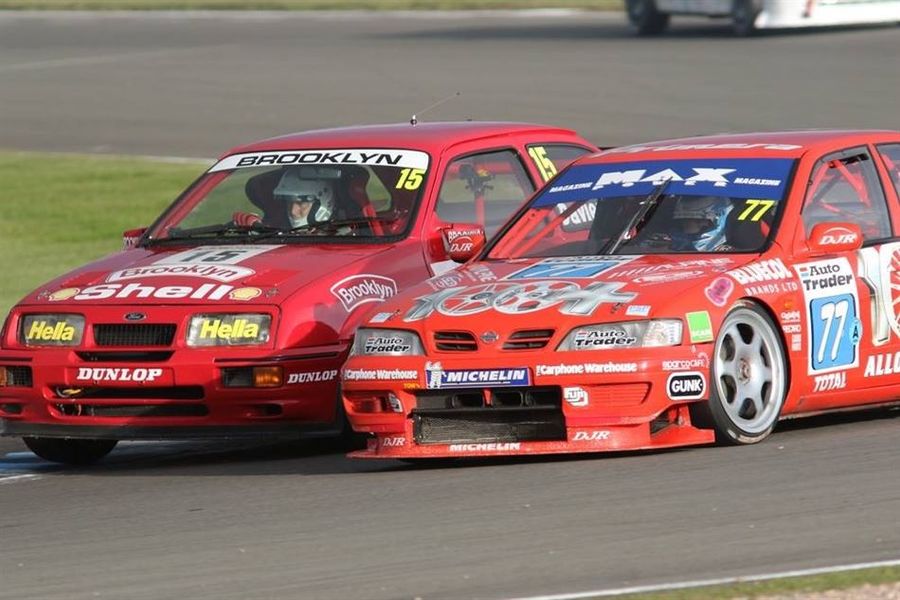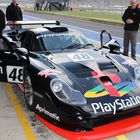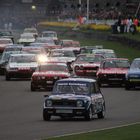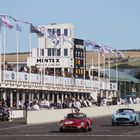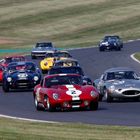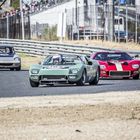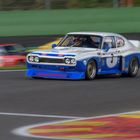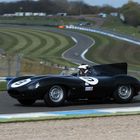Personal View: The Worldwide Growth in Historic Touring Car Racing
- 19 Feb 2016
Share this Article
Our Personal View series offers a platform for you to give your views on historic Motorsport and the history of our sport. Here, Los Angeles-based Heath McAlpine gives his views on the growth of historic Touring Car racing around the world:
"The worldwide resurgence of historic touring cars has seen an unprecedented number of famous cars and their drivers come out of the woodwork to compete. The great thing is though, each part of the world has a different focus to each another.
"Australia has a super strong Group A/C championship and also a growing 5 Litre Touring Car Association designed for V8 Supercars and the earlier Group A equivalant. In Europe the British based HRCC Super Touring Car Cup has seen massive growth with it's golden era Super Touring cars reminding fans of a time of mass popularity and mass manufacturer involvement. Also in Europe is the HTCC or Historic Touring Car Challenge which is run for cars that ran in the ETCC between 1972-1985 so includes early Group A cars and the older Group 1 and 2 touring cars.
"In the US the Trans Am series has been revived and much like Super Touring it provided many manufacturers in the past an opportunity to showcase their product to the American public but provided a David vs Goliath battle between big V8s and smaller capacity touring cars. Much like the resurgence of retro style and pop culture, retro touring cars as well as many retro style race meetings across the world have provided an introduction for young and older fans, a like, of nostalgia.
"Australia has had a strong historic scene for over 10-years with a wide range of Group A/C cars being found, restored and raced in the Heritage Touring Car Series. The popularity of the Muscle Car Masters, Classic Sandown and Phillip Island Classic meets are proof that nostalgia is king. Not only have these meets seen many valuable cars restored but also the rebirth of the lakeside circuit in Queensland which now also hosts the Lakeside Classic weekend.
"Group A and C cars provide the entertainment, mixture of shapes and engines, classic liveries and a chance to see these cars race not fully in anger but steadily at some of Australia's best race venues. In order to race a Group A or C car, the car has to have raced in the period between 1973 to 1992 (for Group C 1973-1984 and for Group A 1985-1992) and must get a Certificate of Description which is given to a car that meets the original specifications that it ran at a race meeting during it's life. That means all cars are original with no replicas able to compete. Originally these cars ran in Sports Sedans before enough support and cars were found to run races specifically for these cars and the next push will have individual races for each class. Of late Gibson Motorsport have caught on to the popularity of the series and are looking after most of their ex-Nissan Motorsport Skylines. Whether this is a good thing for the series it is yet to be seen but with most drivers being owner/drivers and lacking in time and money it is endanger of becoming too professional for what most drivers do for a passion and a hobby.
"Also, the saying 'history always repeats itself' has rung true with the turbocharged Sierras and Skyline GT-Rs now tending to dominate the racing. Not much can be done but a reverse grid race or handicap style race could spice up the racing for spectators and competitors a like. This is one of the most enjoyable series to watch and having been to the Grand Prix and various V8 Supercar rounds it doesn't seem it will disappear and thanks go out to the passionate owners for putting their valuable metal out on display for young and old to watch.
"The strong growth of the HSCC Super Touring Cup in Britain is a major success story as proven by driver's John Cleland and Patrick Watts buying and racing their former cars in the series. Super Touring covers an era of massive manufacture involvement and international recognition with even the US having a championship, that ran from 1990 until as late as 2002. With the popularity of these regulations it was inevitable that these cars would soon be popular with a whole generation being captivated by the cars, the stars and even the TOCA touring car game.
"The HSCC Super Touring Car Cup has supported the BTCC and seen many cars come out of the woodwork such as the Team Dynamics built Mazda 323, a European Alfa Romeo 156 and even some early BMW M3s. These cars are run not only at BTCC events but also do runs at Goodwood, run at the Silverstone Classic as well running there own series which takes in Donington Park, Brands Hatch, Knockhill and Oulton Park. More cars are also coming on stream with Audi A4s, Volvo S40s and Ford Mondeos joining the already variety packed field and enthusiasts from overseas looking to either spectate or enter a meeting or two. Being relatively young this series has much room to grow and massive potential for not only Britain but for many Super Touring car owners and fans worldwide.
"Not only is Europe home to a strong Super Tourer series but also a strong series dedicated to the early years of the European Touring Car Championship with Group A, Group 1 and 2 and Group 5 included covering over 20-years of touring car racing. This series runs all across Europe taking in the classic Spa-Francorchamps, Silverstone, Donnington Park and Portimao. Group A is just starting to gain momentum in Europe with many cars such as Rover Vitesse's, Jaguar XJS's and BMW 528's joining the strong Group 1 Ford Capri's, Group 2 Mustang's and BMW 2002's. This series runs 40-minute races with a compulsory pitstop which is different to any other historic series and also takes in one of the best touring car eras, Group A. The series only lets in early Group A cars which means no RS500 Cosworths or GT-Rs but the previously mentioned Vitesse's and XJS's as well as Ford XR4i's and Alfa Romeo GTV6's.
"This means not one car will dominate but every car will have a chance plus these cars were introduced before turbos became reliable and before the evolution rule came in so are pretty basic vehicles. This series will grow more when more cars are found and restored because as Australia has shown, historic touring cars is a very popular and friendly way to enjoy motorsport.
"America had their golden era for road racing in the late 60s early 70s when Trans Am racing ruled the land. With an unprecedented amount of manufacturers, professional teams and superstar drivers it has gained a cult following among the baby boomers who have always strived to own and even race these cars such as the Mark Donohue Camaro or a Dan Gurney Mercury Cougar.
"The series runs at famous circuits such as Laguna Seca, Sebring, Lime Rock and Watkins Glen plus each key manufacturer is represented in the series with Dodge, Ford, Mercury, Chevrolet, Plymouth and Pontiac. With over 70 cars listed to run strength is in numbers and the variety shown above are just some of the reasons why it's popular but also the great tracks and the enthusiasm of the owner/driver's are the main reason.
"The passion is clearly shown by the amount of car's on the grid and the presentation of each car which is a true representation of what the car raced as back in the era. The series supports the original driver's, journalists, family members, former crew members and workers who experienced the series with just like what happens in Britain and Australia, the original driver's being reunited with their old car. As quoted it is 'the world's fastest, loudest museum' which would be hard to argue against.
"It seems nostalgia is still king with historic racing growing by the second with also NZ starting to have a historic race series as well. The interest can be partly helped by the coverage on social media with many pages dedicated to each particular era of touring car racing. These pages make it more accessible to the fan who can take a close a look at a restoration, past photos and anecdotes that have been hidden in the past.
"Youtube also has a lot to answer for with many ETCC, ATCC and BTCC races being well covered and being able to be discovered by the younger generation. For many drivers it was only a dream to drive many of these cars but most not only drive but own the touring car of their dreams. This passion drives each category and also is shown to the next generation who will preserve and protect the strong history that continues to be made by these car's and categories. May history live on through these categories and the passionate people behind the scenes."
Heath McAlpine.
If you would like to share your thoughts on HistoricRacingNews.com, please mail us on info@historicracingnews.com. We cannot promise to use everything we are sent but your thoughts are always of interest and can guide our editorial direction.
Popular Articles
March 2025 Podcast: Targa 66, Race Retro, Scalextric and Famed Journo Pete Lyons!
February 2025 Podcast: Brian Redman, the First Daytona 500, the Pick of the Ecclestone Collection and so Much More!
January 2025 Podcast -Indy Collection, Daytona and Baghettii's Debut F1 Win!
December Podcast: Derek Warwick Part Two...F1, Le Mans and More!


